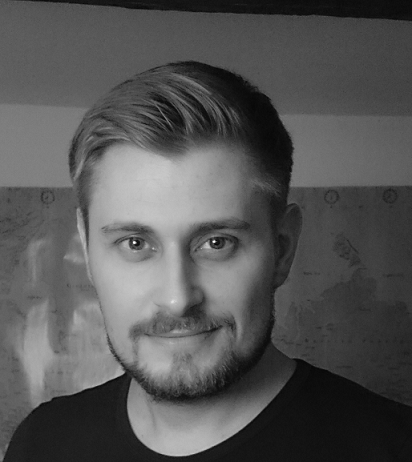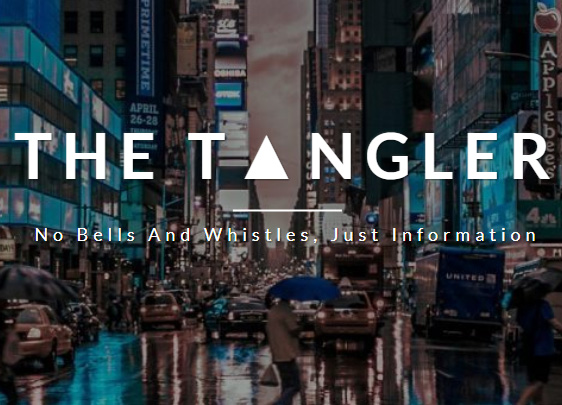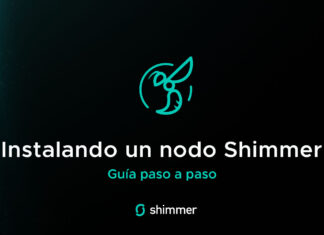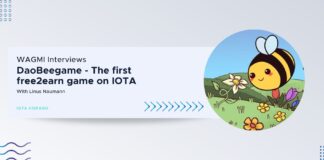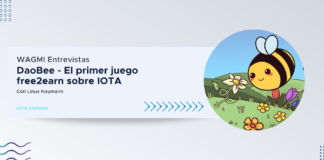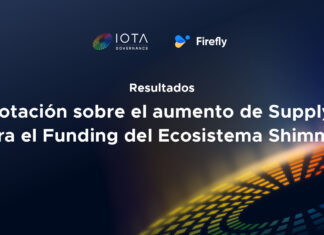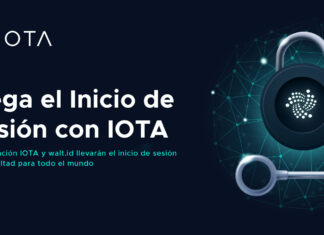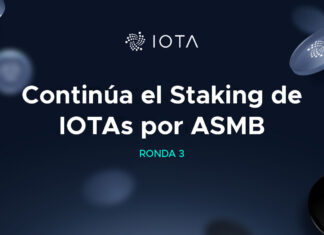
Since I started following IOTA I became a big Sunday Banter fan. The way in which Steffen Vogt, more known as Limo, covered the weekly news around the project, saved me lots of time. But that was not all: his way of understanding the weight/potential each piece of information had (or not) helped me a lot to elavorate my vision of the ecosystem status.
Some time ago, Daniel Telschow from our editorial team came up with the idea of interviewing Limo. I told him what I usually say: go for it, we need to do everyone!
Since last week the Sunday Banter series turned one year old we thought this was the perfect moment to conduct this interview. Thanks to Limo por the time dedicated to this awesome interview full of stories. This is the sort of material that helps our readers understand a bit better the history of IOTA.
Daniel De Michele (Carpincho Dem)
Head of contents, IOTA Hispano
IOTA Evangelist Network member
If you like what we are doing help us to continue working! Donate: CDJ9RVDPJRAIULRAEONDLZGM9VSKFSSOUFSQOAJPDPTFOOCVGGWVMDJQVPYHEOERGL9NQD9OAWYAIBTMC9CIRZREYC
Can you tell us a bit about yourself? What did you do before entering the DLT-space?
I made an apprenticeship as an electrician and worked for 6 years on construction sites. At some point I felt like that wouldn’t satisfy my curiosity in life, so I decided to graduate (Abitur in Germany) in order to be able to study. I first studied 4 semester electrical engineering, but the circumstances were so boring that I moved to another city and chose geography because I wanted to understand the world and have positive people around me.
After my Bachelor I started my English master in environmental geography, a mix of physical geography, sustainability, statistics and GIS. That was an interesting topic in the human/nature interface. I was already working on my Master-thesis, when IOTA came across.
When and how did you get involved in this world?
In 2013 I read about Bitcoin. I did all the mistakes you could have done back then including buying an USB miner in order to mine Bitcoin with the high German electricity prices, I also bought at approx. $1000 / BTC, and I even bought some coins on eBay, just to experiment with them. It’s important to understand that, especially in this field, you learn from your mistakes. And since I was trying this and that without any help or experience from others, I made plenty. But that was a funny time. It’s interesting because if I think back, I can totally understand that people, today, are scammed so easily. The market is still a big shark pond. From that perspective, nothing changed.
In 2014, after the market-hangover of MtGox some other projects came up and I felt like I wanted to be a part of that. I figured that with my statistics, R, GIS experience I could probably be a help to some people, so I chose sustainable projects with a better outlook in terms of scalability than Bitcoin. In 2013 people were already thinking about scalability and Earthcoin was faster, greener and had some great plans in order to bring Australia’s farmers on board. There was already a pilot project in order to pay self sufficient farmers and their products -for Earthcoins. I tried to support them with articles, Twitter, support whatever. I’m pretty sure you never heard about Earthcoin,
which is evidence how successful that went.
This field was ever and will ever be lead by those that find real innovation and adoption faster than others. That is the reason that 95% of all projects will go down very soon.
When was the first time you heard about IOTA? What was your first thought?
In 2014, when I lost 60% of my investment, I took a step back in order to concentrate on my job, university and sport. But after a while I figured it would be a good idea to keep track of crypto because this market moves fast and there are countless possibilities for a geograph and as an investor.
So I decided to stick to the announcement channels in Bitcointalk and to scan each and every project in hindsight of quality, team, outlook and especially sustainability as the geographer I am. ICO’s were a new thing and I didn’t want to participate so I missed Ethereum, but I bought in early which was great because I was able to pay for my studies. I found IOTA, read about it for a while, became familiar with the vision and the founders and decided 3 months after the ICO that I should invest the rest of my money, which I did. These 3 months delay still bug me, but I think I can still be very happy that I bet on the right horse!
Anyway, the IOTA community was different. They had this great idea of scalability, zero fees and no mining, so I concluded «this is it!». This is the next big thing and the ultimo ratio this cryptoecosystem can create in order to challenge the scalability problems. And since then, lots of hurdles have been taken, so I still have the feeling that IOTA will be the solution many people and companies will use in the future. And I think it’s the one investment I can reconcile with my geographers heart.
We love the Sunday Banter. It’s IOTA’s weekly news resume. Tell us the story, how did you decide to start with it?
It was June 2017 when I decided that my weekly posts on the Tangler were not enough to inform people. So I decided that I should do what I’m capable of in order to support the ecosystem: talking about IOTA, about my experiences, about the outlook etc. Because at the end of the day, I’m the one that is loitering on Twitter, Slack (nowadays Discord) and Reddit all day, so why shouldn’t I share my information with everyone. It doesn’t cost me anything but time and brings value if I do it right!
So, the Sonntagsplausch and the Sunday Banter is one year old now (54 episodes in German already!) , and I kind of think it was a success, so I think I keep doing them.
How many hours a week takes you to gather all the data you usually need and why are you doing it in two languages?
I need at least 15 hours for both every week. It started with 2-3 hours but it’s not possible anymore because there are way too many sources I need to scan, filter, understand, order and decide what’s good and what’s bad. Also, I have to ensure that no project feels ignored when I not talk about them, so I need to include them in the next episode.
In the end it could be possible that I act as an information bottleneck so I need to ensure that I never miss any important information. It’s not always possible, but I do my best. I decided to add the English version because many people asked me to do it. In exchange they told me to support my work on Patreon and with iotas which worked very well so far. While we’re at it: Thank you people for supporting me! You made it possible that I can concentrate on IOTA 100%, thanks for that!
What is your relationship with the IOTA Foundation. Do you know some of the guys?
My relationship with the IOTA foundation is good, professional and of respectful nature.
I know them since 2016, I was even there before they announced their very first team-member, so I had many arguments with them, good ones and bad ones. The first big beef happened when I attacked the whales of the community because I was frustrated that they didn’t want to spend 5% of their tokens to make the foundation possible. Back then I was extremely aggressive and I’m pretty sure that David had his finger on the ban-button already. That was close.
I know all of them good enough to contact them if something very important comes up, but they are way too busy to deal with people in the periphery on a daily basis. Which is a good sign! That doesn’t mean that they work in an ivory tower, but it’s not an easy thing to reach all of them.
A big part of the foundation like Ralf, Navin, Eric, Andrew, Edward, Lewis or Paul are especially active and great persons. Since then, the foundation grew in numbers and specialization. It’s not possible to get in contact with all of them, but when I contact them, I always get what I need. I never had a bad experience with one of them, because every single foundation member is respectful, knowledgable and behind the vision of IOTA.
Let’s talk about the leaked anonymous information that you published last February. What was your first reaction when you got access to DCI-IOTA email exchange and went through all of it?
My first reaction was a sudden feeling of justice. I read every single email and concluded that it’s in everyones best interest to show the truth without a filter. Of course this thing is a politicum, a very sensitive topic, but it’s a necessity if you want to challenge lies, corruption and the deeds of conflicted parties that act solely for monetary reasons. The truth can be complicated sometimes so I knew the Foundation wouldn’t like it at all, but I’m in my position, not in theirs.
Have these leaks caused any serious threat to your person? In hindsight, would you do this again?
I would do it again, yes. This space is the most corrupt field I’ve ever seen so we need disclosure of sensitive information when it helps the ecosystem. DLT’s, naturally, attract venture capital companies, elbow thinking and not rarely conflicts of interest. If I can contribute truth and force integrity into this ecosystem then I certainly chose to do that again if I get the chance.
I received a lot questionable comments, messages and emails for the leaks, and I also received two death threats so far, but they are not connected to the leaks. Drama is part of crypto I guess!
Let’s put the past behind us: Explain a bit about your current projects. Are you currently satisfied with your blog, your YT-channel and IOTA-chronicle.com?
Well, it’s a road I’m trying for the first time, so I still need to try this and that, but I guess I’m kind of happy that I took it at all. My blog is for a very special readership. It’s not even for the core IOTA investors or believers, but for those that missed out important information or that didn’t have time to make up their mind about a certain topic. So I basically bring information I find complicated down to a digestable level for people that have no time to do that.
Sometimes it’s about FUD, sometimes about my personal vision or sometimes about technical background.
My youtube channel is an addition to that. I try to inform people and also to create some kind of a community that understands what I see in IOTA.
That’s not very easy because Youtube looks to me like the place where many «lambo-investors» collect their info when they want to invest. So I have to deal with many trolls, many ideologists from other projects and a general rejection of IOTA. But it get’s better the more solid, healthy industry adoption we see. People start to believe!
IOTA-chronicle.com (IC) is my problem child. I had problems with my developer because he didn’t finish the page because of personal issues in his family. Since then I kinda focused on other things, because that page needs time, money efforts, nerves I don’t want to spend right now. In a few weeks maybe. And if there is a capable developer that wants to talk about business, you know how to find me 🙂
Are you excited for the future of IOTA? What is the biggest feature/project that you look forward to?
As you can imagine, I’m super excited for the future! IOTA makes so much possible, it’s mindblowing. My personal vision is that the machine-economy generates more value than it needs so that countries can tax the machines and finance the universial basic income with that. We shouldn’t forget that the demographic outlook isn’t very appealing in terms of pension / retirement pay etc. That the first thing you learn when you study Geography. With cyberphysical systems, a taxed machine economy and IOTA as a transaction layer, I can imagine this problem will be solved before we get old, so that is certainly one reason I’m doing this.
I was always a person that liked Star Trek, innovation, better conditions for everyone because I’m in my heart a lefty. That doesn’t mean a politically left person, but someone who believes in a vision where everyone can live, do, enjoy life, next to each other, wherever he wants. Education, liberty, tolerance (be, do and believe in whatever you like but leave other people alone) , progress, sustainability and a technocracy that is working on a global scale. And we need to create value for that. New value!
The next industrial revolution can probably create this value, so that we don’t need to take it away in one place in order to concentrate it elsewhere. We just leave the values where they are and create new value. No one can argue value reproduction.
What is Limo’s vision for the coming years? Do you have any future projects in mind? What are you waiting for to start them?
As mentioned on Twitter a while ago, next to my blog, Youtube, Twitter and IC, I will probably write a book about all of this. I made some unique experiences in the last 4 years I really want to share. And I think there is a market and a need for stories like that. People want to know what’s going on in this subculture. But I will start to write it in my mother tongue, because I’m a way better writer in German as in English, naturally. If I ever finish that book, I will translate it to English of course! I owe you guys that much.
Thanks for the opportunity and the support!
If you like what we are doing help us to continue working! Donate: CDJ9RVDPJRAIULRAEONDLZGM9VSKFSSOUFSQOAJPDPTFOOCVGGWVMDJQVPYHEOERGL9NQD9OAWYAIBTMC9CIRZREYC


